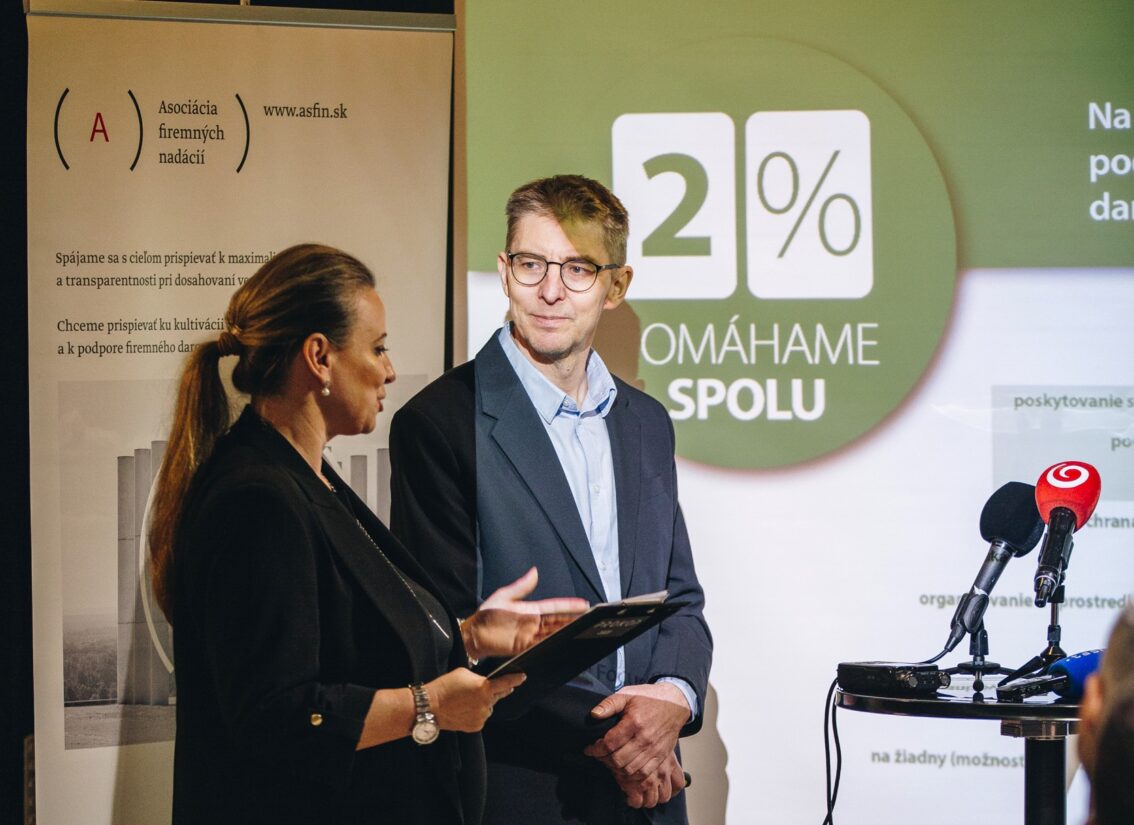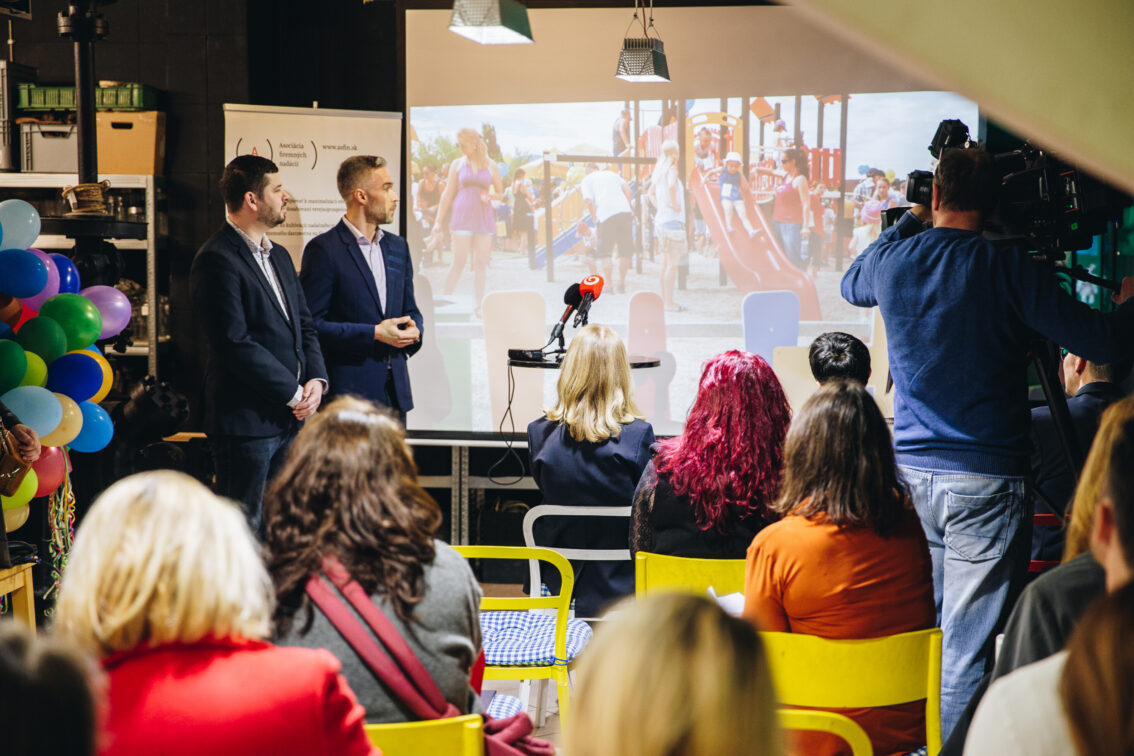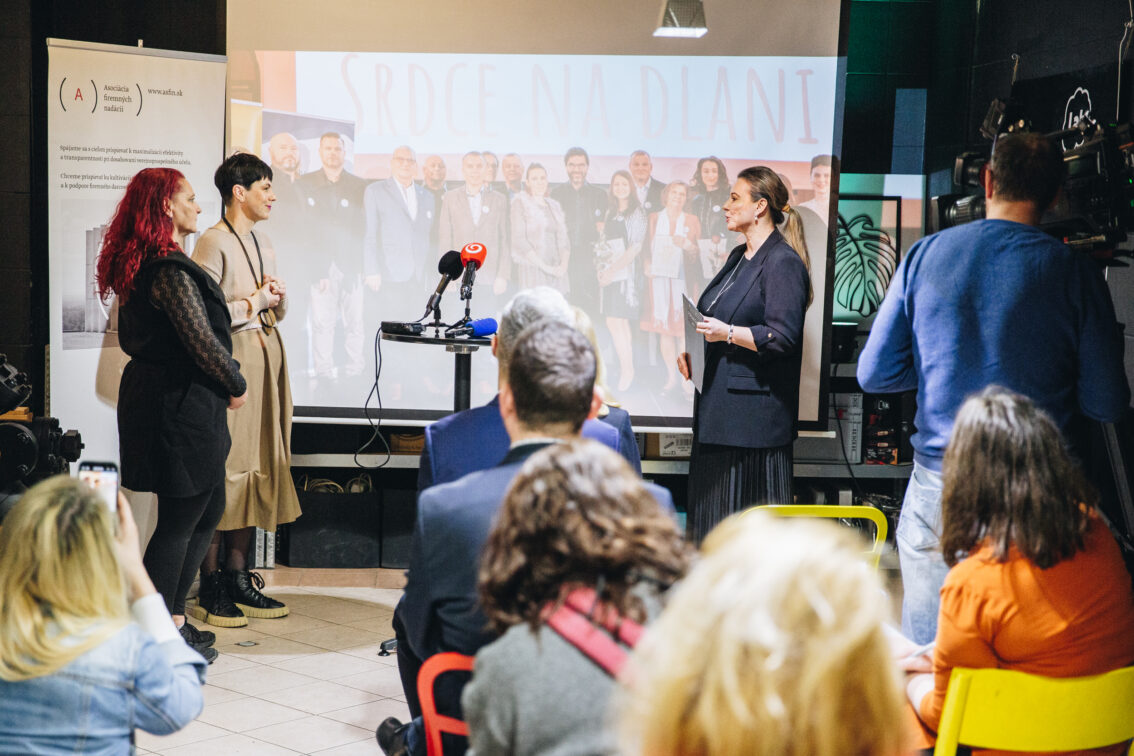Survey: Majority of People Believe 2% Tax Allocation Improves Life in Slovakia
Companies that wish to allocate part of their taxes to support public-benefit initiatives can do so until March 31, 2025. For employees, the deadline is the end of April. Nearly one million individuals and almost 63 thousand legal entities make use of this option.
Seven out of ten Slovaks are convinced that funds from the 2% tax allocation help improve people’s lives. This was revealed in a representative survey conducted by the Focus agency for the initiative “2% – Helping Together”. Pontis Foundation is part of the initiative.
Respondents consider the support for organizations focused on helping people in need, healthcare protection, and social services to be the most important. They also appreciate the opportunity to allocate part of their taxes to organizations of their own choice.

The survey results were presented by Martin Slosiarik from the Focus agency.
The survey also showed that allocating 2% is the most common way Slovak citizens support civic organizations. People prefer to help schools, kindergartens, charitable organizations, hospitals, and other healthcare facilities. One-third of respondents also made financial donations to organizations, and nearly a quarter stated that they help through volunteering activities.
High Awareness of the 2% Tax Allocation
Even those who do not allocate their taxes know about the possibility of donating 2% to nonprofit organizations. Among individuals, as many as 92% are aware of this option, while two-thirds of surveyed companies also have this information. Awareness is high across all regions, with the highest levels in the Prešov, Žilina, and Trenčín regions.
The growing popularity of the 2% tax allocation as a mechanism for supporting public-benefit projects is reflected in the increasing number of donors and allocated funds. In 2021, the total allocated amount was €87 million, whereas last year it reached €105 million. The number of registered beneficiaries also slightly increased to 18,028. As much as 82% of organizations received less than €5,000, confirming that tax allocation significantly helps small organizations, such as educational institutions and local charities across Slovakia.
The Role of Corporate Foundations is Significant
Corporate foundations play an important role in redistributing funds to the regions. They divide grant funds among other charitable organizations, which are obliged to use them for public-benefit purposes.
“Thanks to the 2% tax allocation, both individuals and businesses can systematically support charitable organizations, which largely provide help where the state resources are insufficient. This mainly concerns social services and healthcare. Without the tax allocation mechanism, many regional organizations that assist people in need, support education, and often lend a helping hand to those facing hardship would be at risk of being shut down or significant restrictions in their activities,” says Lenka Michálik Holešová, a Board member of the Association of Corporate Foundations and Endowment Funds (ASFIN).

Lenka Michálik Holešová, a Board member of the Association of Corporate Foundations and Endowment Funds.
According to the latest available data, ASFIN members used 96% of tax allocation income for public-benefit purposes, with only 0.04% spent on communication and less than 4% on administration.
Slovaks Do Not Want to Give Up Tax Allocation
The perceived benefits of tax allocation outweigh any negative aspects. According to the survey, 80% of respondents support maintaining the 2% tax allocation option for both individuals and legal entities, particularly for social assistance to people in need (52%), healthcare and social services (49%), education (27%), and environmental protection (22%).
Companies Can Multiply Their Support
Until the end of March, companies can increase their support from 1% to 2% if they make a donation in the amount of at least 0.5% of their paid tax to a registered nonprofit organization. Currently, 11% of companies do so, with their share gradually increasing from 9% in 2017. This is more common among companies that have their own corporate foundations or endowment funds.
As for ASFIN members, tax allocation income makes up for about two-thirds of their total funding, with the rest coming mainly from donations, primarily from parent companies. “The 2% tax mechanism encourages businesses to multiply their support. In 2023, ASFIN members distributed €8.4 million from tax allocation resources and used an additional €6.5 million from donations provided by parent companies and other sources. Besides financial support, companies and their corporate foundations also provide material aid, volunteers, and professional consulting,” adds Lenka Michálik Holešová.
How the 2% Tax Allocation Helps
The Volkswagen Slovakia Foundation, a member of ASFIN, has distributed over €2 million since 2010 thanks to the 2% tax allocation to more than a thousand local organizations across Slovakia via small grants of up to €2,500. “These projects focus on children, people with social, health, or other disadvantages, homeless people, and seniors. Support has primarily been directed towards schools, healthcare facilities, municipalities, and sports clubs,” says Martin Kováč, project manager of the Volkswagen Slovakia Foundation. The scale of supported projects is therefore highly diverse.

Martin Kováč from the Volkswagen Slovakia Foundation and Tomáš Bezák, manager of the Lidl Foundation, presented a wide range of supported activities.
The Lidl Foundation also supports a broad spectrum of activities, focusing particularly on healthcare and social initiatives. “We are aware of the importance of these issues for society. An example is our contribution of €5.5 million for life-saving medical equipment for newborns in hospitals through Dobré rozprávky (the Good Fairy Tales project). We have also supported the Pediatric Cardiac Center, oncology departments, and the Slovak Red Cross. Tax allocation is a crucial mechanism for helping Slovak patients,” says Lidl Foundation manager Tomáš Bezák.
The 2% Tax Allocation Supports Volunteering and Community Organizations
Many community organizations that engage in cultural, social, environmental, and educational activities in Slovakia operate on a volunteer basis. “The 2% tax allocation is crucial for community organizations and determines their ability to function. It is also vital for developing volunteer programs and promoting the value of volunteering,” explains Zuzana Šujanová from the Volunteer Center of the Trnava Region.
The center oversees dozens of organizations that develop both long-term and short-term volunteer programs. “There is minimal systemic support from the state for volunteering, and the 2% tax allocation is the only source of funding for many organizations,” she adds. The funds are used to pay volunteer coordinators, purchase materials for volunteer programs, reimburse travel expenses, or rent spaces for regular volunteer meetings and activities.

Srdce na dlani (Heart on the Palm) award is dedicated to the most active volunteers.
Úsmev ako dar (Smile as a Gift) has been helping the most vulnerable group — children and families from disadvantaged backgrounds — for 35 years. Currently, it systematically works with 525 families in Slovakia, supporting 1,050 children. It is the largest provider of residential social services with family and child guidance in Slovakia. With the capacity of over 300 people and 39 housing units under its management, it is a leader in providing social rental housing with assistance services.
“The 2% tax allocation allows companies and individuals to contribute to positive changes in their communities. In the case of Úsmev ako Dar, it helps finance projects and activities that have a positive impact on society, especially on children growing up in foster care,” says Štefan Adamjak, the organization’s executive director.
As a specific example, he highlights the provision of professional guidance. “Our volunteers spend time with children, tutor them, and accompany them to extracurricular activities. Meanwhile, parents can confide in our staff in a safe environment without fear of judgment,” he adds.


